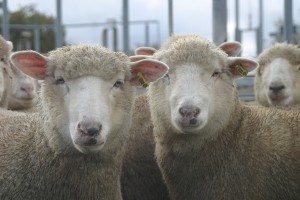
Lambs with electronic EID or RFID tags.
VICTORIAN government support for the mandatory electronic tagging in sheep and goats will continue as part of a $44.4 million two-year commitment to biosecurity included in Victoria’s 2017-18 budget.
The Andrews Labor Government said the funds will support Agriculture Victoria to secure overseas market access for farmers and continue to protect our state from invasive pests and diseases.
This will maintain the state’s crucial agricultural biosecurity, protecting access to international markets and supporting regional jobs, the State Government said today.
An additional $19.2 million over four years will go towards a ten-year national plan to eradicate the invasive Red Imported Fire Ant.
The ant can cause significant damage, placing the health of livestock, farm workers and the environment at risk. It was first detected in Brisbane in 2001.
The government said the funding reflected its determination to rebuild Victoria’s agricultural bio-security system, which had been drastically undermined by ongoing cuts under the former Liberal-National Government.
The Victorian Auditor-General found that funding for core livestock biosecurity was cut by 49 percent between 2009-10 and 2014-15. The number of animal health and veterinary officers also shrank by 42pc, weakening Victoria’s capacity to prevent, prepare for and respond to a major livestock disease outbreak, such as Foot and Mouth disease, the government said.
Minister for Agriculture Jaala Pulford said Victoria’s primary producers continue to punch well above their weight.
“They’re doing their part – it’s up to government to do ours.
“By investing in biosecurity, we’re protecting our state’s clean, green reputation and the livelihood of thousands of Victorian farmers,” she said.
“We’re taking action because we know that strong biosecurity means a strong agricultural sector.”
Farmers praise biosecurity windfall but urge permanent funding
The Victorian Farmers Federation commended the Andrews Government for biosecurity commitment, but VFF president David Jochinke said the state’s biosecurity status needed to be protected with permanent funding in the same way as police and health services were.
“Australia’s stringent biosecurity protocols is the reason our farmers can compete in global markets, so it’s fantastic to see the Government make a serious funding promise to maintain the quality of our biosecurity.
“A two-year commitment is better than the one-year commitment we’ve seen in the past, but our reputation as a nation free from many of the diseases and pests that plague the rest of the world is still on the line,” he said.
“We expect essential services like police and health departments will receive permanent funding to perform their duties, and biosecurity needs to rank on that scale as an essential service that is necessary to preserving the agriculture industry.”
The VFF said it had criticised previous budget cuts that slashed biosecurity funding by 49 percent in 2009-10 and 2014-15.
“We have been highlighting the risks of eroding funding for biosecurity for years,” Mr Jochinke said.
“It’s vital that this is addressed to give the farm sector the best chance to respond to any disease outbreaks, like Foot and Mouth disease.”

HAVE YOUR SAY